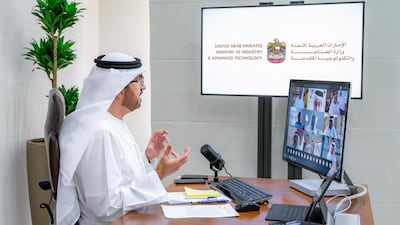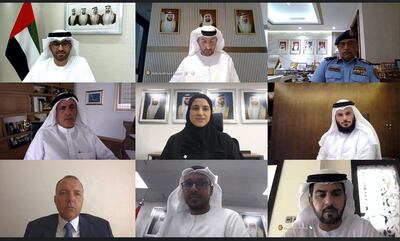The UAE's minister of Industry and Advanced Technology called for a public-private partnership approach to boost the country's industrial development amid a push to empower national industries and improve their competitiveness.
In his first meeting with members of the Industrial Co-ordination Council, Dr Sultan Al Jaber emphasised his plans to work with the council and the private sector to boost in-country value creation by supporting small and medium-sized businesses and creating sustainable jobs.
“A key enabler for success will be an active engagement with both the public and private sectors to ensure regulatory and legislative frameworks are optimal, relevant and adapt to the realities of today, and are flexible enough to provide the right platform for the change and growth our leadership envisages in the decades ahead,” Dr Al Jaber said on Monday.
The UAE is focused on using advanced technology to develop its manufacturing sector, in line with its strategy to diversify its economy, reduce reliance on hydrocarbons, attract foreign investment, draw high-skilled employees and create jobs while boosting the export of products made in the country.
Governments in the Gulf region are increasingly turning to the PPP model, which can help finance major infrastructure and utilities projects.
Many of them are developing legal frameworks to regulate PPP projects, which are expected to improve transparency and attract investment.
Earlier this year, the Abu Dhabi government said it planned to issue PPP infrastructure project tenders worth Dh10 billion to boost investment in the emirate.
Last month, Shamal Az-Zour Al-Oula Power and Water Company started trading on Boursa Kuwait’s premier market, becoming the first PPP project to be listed in Kuwait.
The ICC, which was launched in 2016, has a mandate to help develop a national strategy that buttresses the UAE’s industrial sector. It sets key performance indicators, proposes policies and initiatives that enhance co-operation and works with relevant government bodies and the private sector.
For the first time, the ICC meeting included important members of the private sector who shared their views on current regulatory and policy challenges.
The UAE has developed local industrial champions such as Mubadala Investment Company’s aerospace manufacturing unit Strata, Emirates Global Aluminium, RAK Ceramics, Ducab and others.
“We must leverage the fundamental building blocks that are already in place, including our world-class logistics infrastructure, unique energy assets and a leading position in technological innovation and AI [artificial intelligence] education, to drive our economy into the fourth industrial age,” Dr Al Jaber said.
The ministry will team up with the council and its working groups to “align on goals and initiatives; identify, consult on and resolve issues at emirate and federal levels; test and prototype policies before they are rolled out; and engage with the industries, technology leaders and companies as a listening, constructive partner”, he said.
The ministry intends to boost the contribution of advanced technology to sustainable economic growth, raise the UAE industrial sector’s efficiency and competitiveness as well as support strategic industries that contribute to the development of the national economy.
Sarah Al Amiri, Minister of State for Advanced Sciences, said it was “critically important” to align efforts in adopting Fourth Industrial Revolution technology – including the Internet of Things, real-time data analytics and robotics – to support current industries.
“We will establish new industrial clusters that both utilise and develop advanced technologies – supporting home-grown enterprises and attracting investors and investment,” Ms Al Amiri said.
“As a ministry, we will work with our partners in public and private sectors to concentrate research and development efforts and output on the technological needs of the industrial sector for the benefit of today’s and tomorrow’s economies.”
The Ministry of Industry and Advanced Technology was created after a Cabinet reshuffle in July. It was tasked with strengthening the UAE’s industrial sector by drawing on advanced technology and the tools of the Fourth Industrial Revolution.



